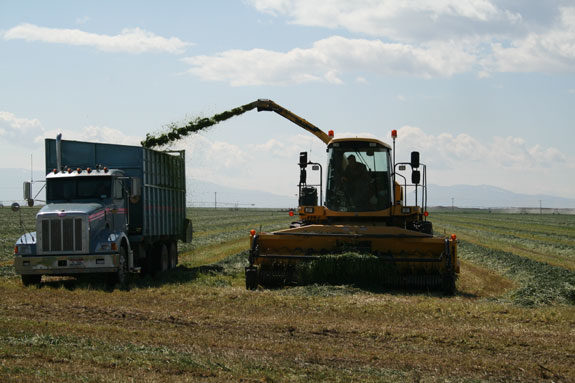Early last winter, I visited a Michigan dairy farm that was having problems with its corn silage. In looking at the silage it was immediately obvious that it was poorly processed; in every handful there were obvious whole or barely cracked kernels.
The farmer had his neighbor custom harvest his corn, and didn't bother to discuss processor settings with him, nor did he check the crop as it was being ensiled. The result was several thousand tons of corn silage that wasn't much better than an unprocessed crop.
When I pointed out this problem to the farmer, he said‚ "Maybe I'll have someone else chop my corn next year." That's one alternative but maybe there's a better one, such as discussing with the custom operator (in the above case, the next-door neighbor) what you want before he starts, and then monitoring the results while he's chopping.
I'm no expert on silage processor setup, but would be willing to bet that the processor clearance was more than the generally recommended 1 to 3 millimeters.
This wouldn't be worth an article if it was the first time I'd seen poorly processed corn silage harvested by a custom operator, but it's not.
Often I discover the problem while trouble-shooting something else. I've seen corn silage custom-chopped in the milk stage ("It was the only time my custom operator was available"), chopped at black layer and chopped so fine that it looked like green confetti.
If you use a custom operator, discuss with him well beforehand what you want in terms of maturity, chop length and kernel breakage. (That's why you're reading this now and not in September.) If he's not cooperative you'll have plenty of time to look for someone else to chop your corn.
If the custom operator is okay otherwise but really has to chop your corn early in the season, consider planting slightly earlier-maturity hybrids, and/or getting your corn planted as early as possible. The first is usually easier than the second.
There's often a big difference between a custom operator who does this for a business versus the farmer who chops corn for a couple of his neighbors. Most custom operators are easy to work with and willing to accommodate the needs of their clientele.
As for your neighbor: Are you a better farmer than he is? If so, is he really the guy you want harvesting your crop, a process that will influence silage quality (and therefore herd performance) for the next twelve months?
—Excerpts from Miner Institute Farm Report, February 2011













